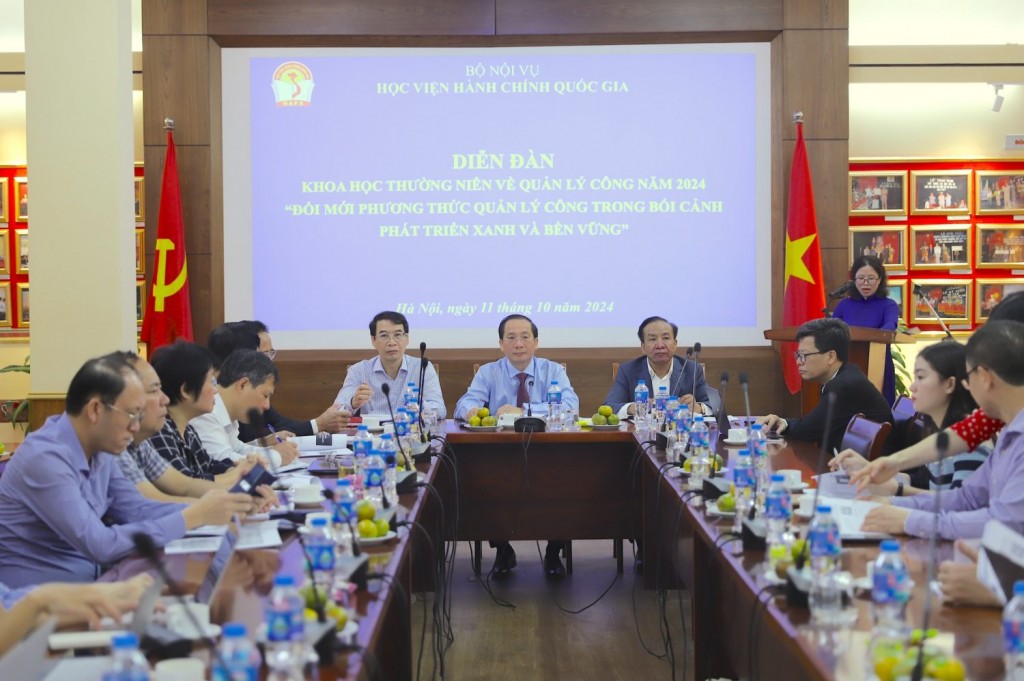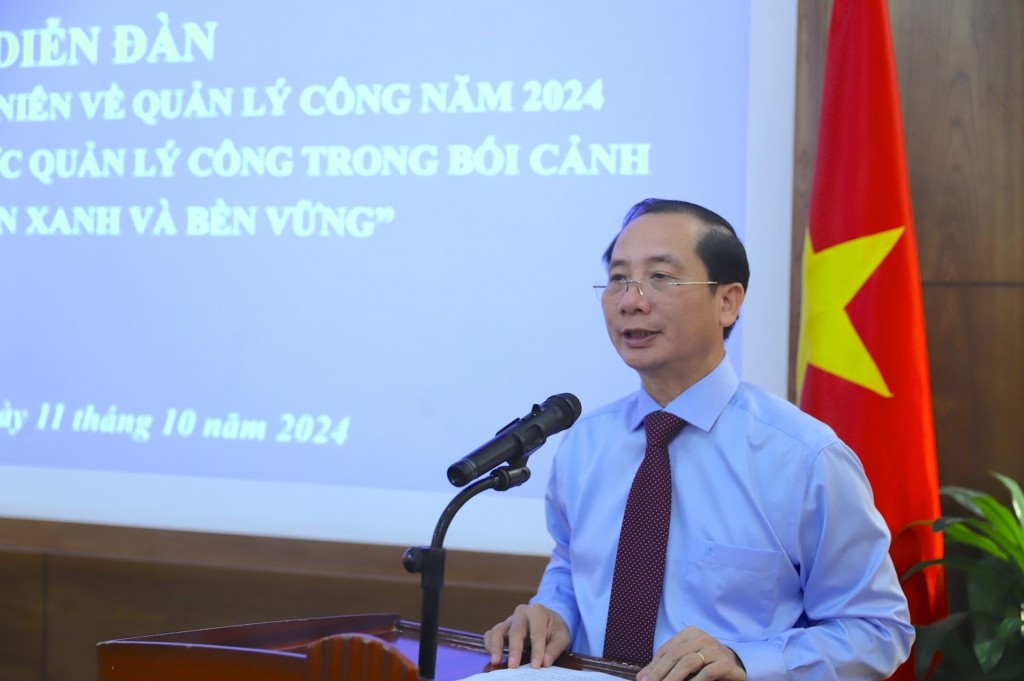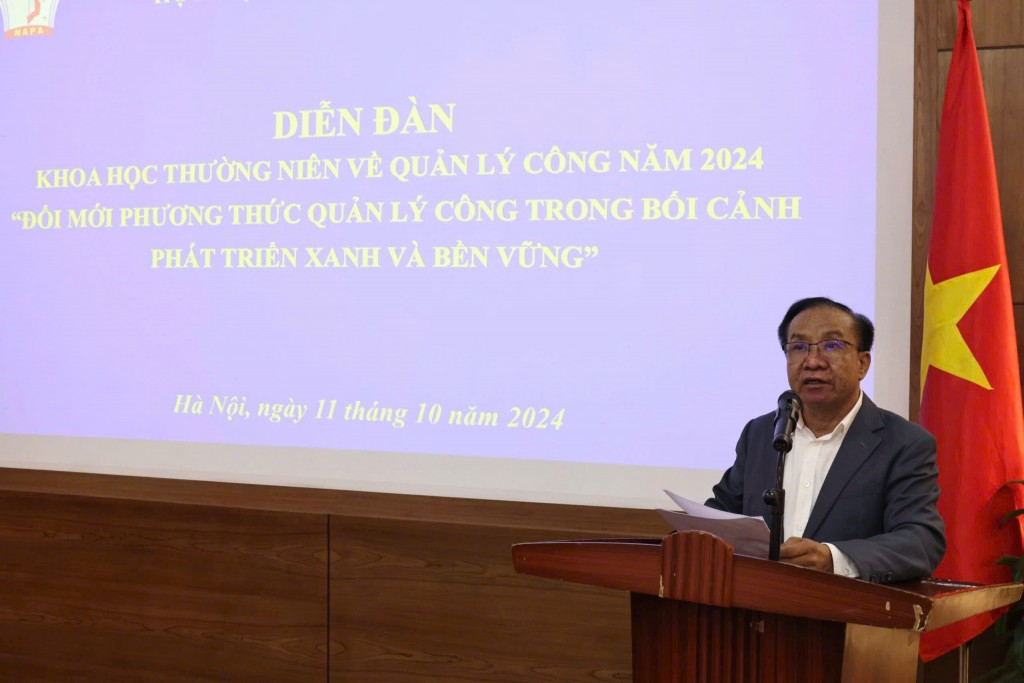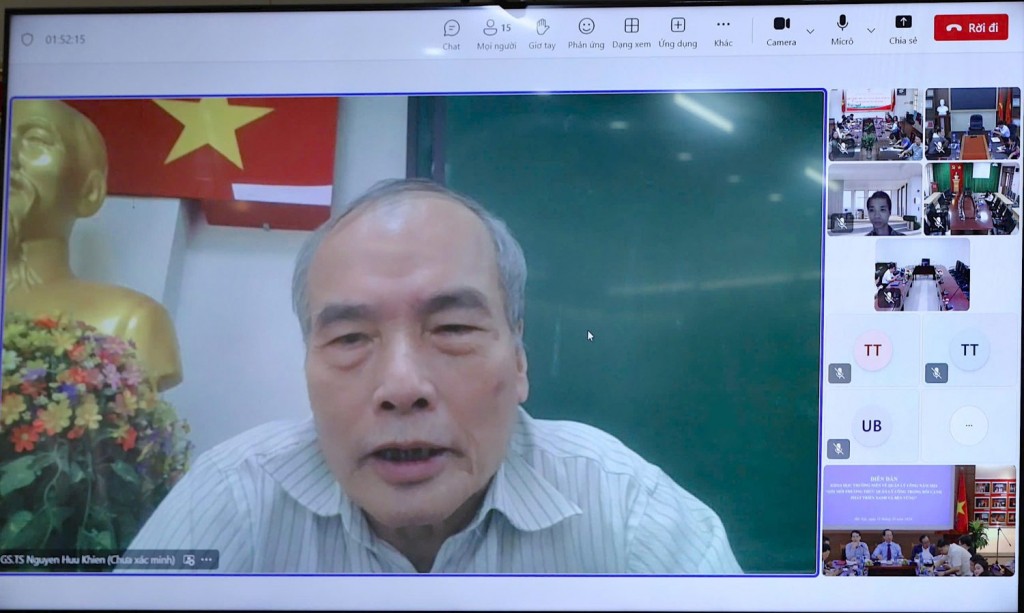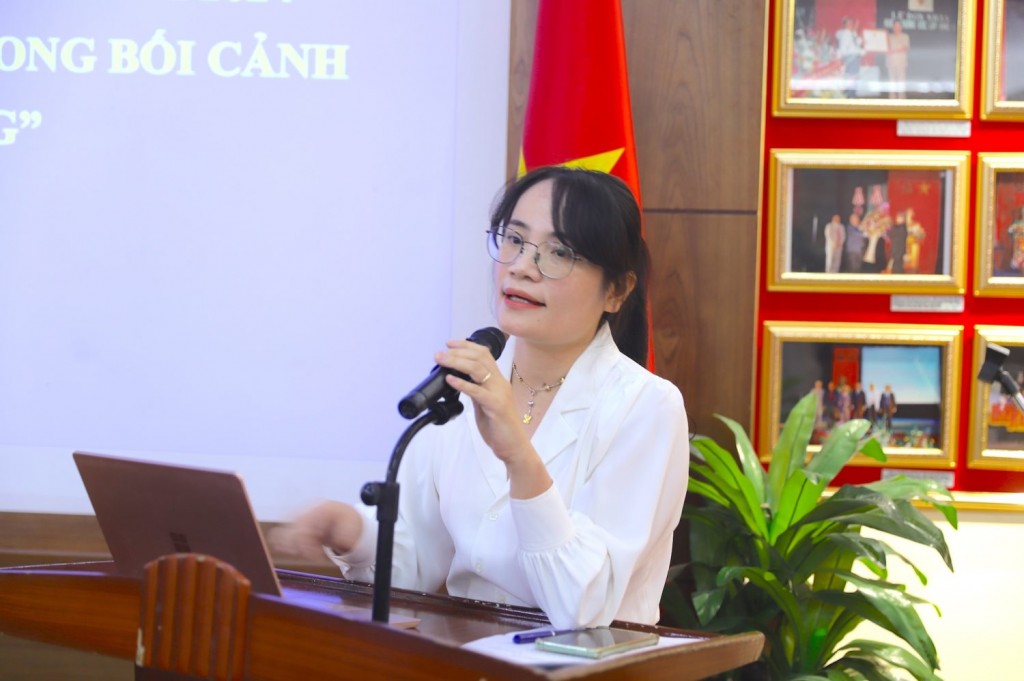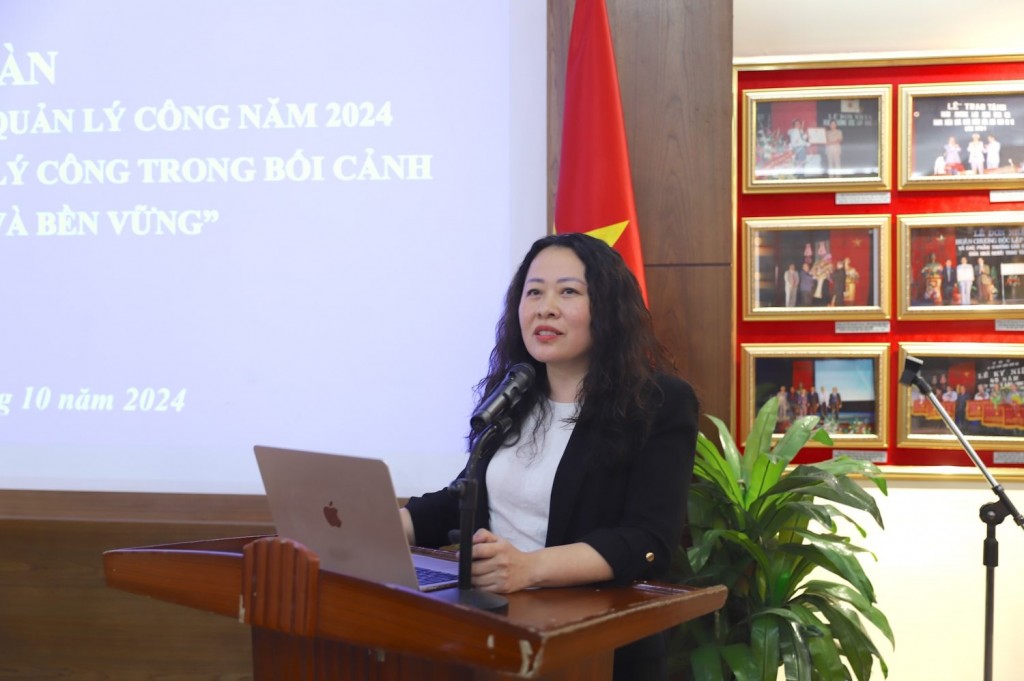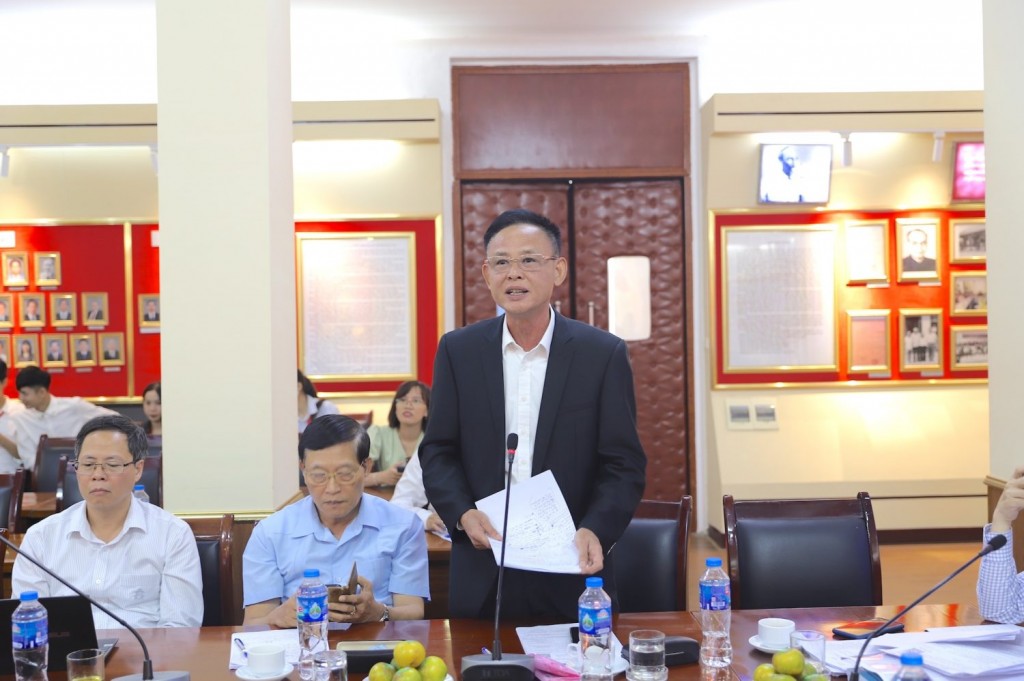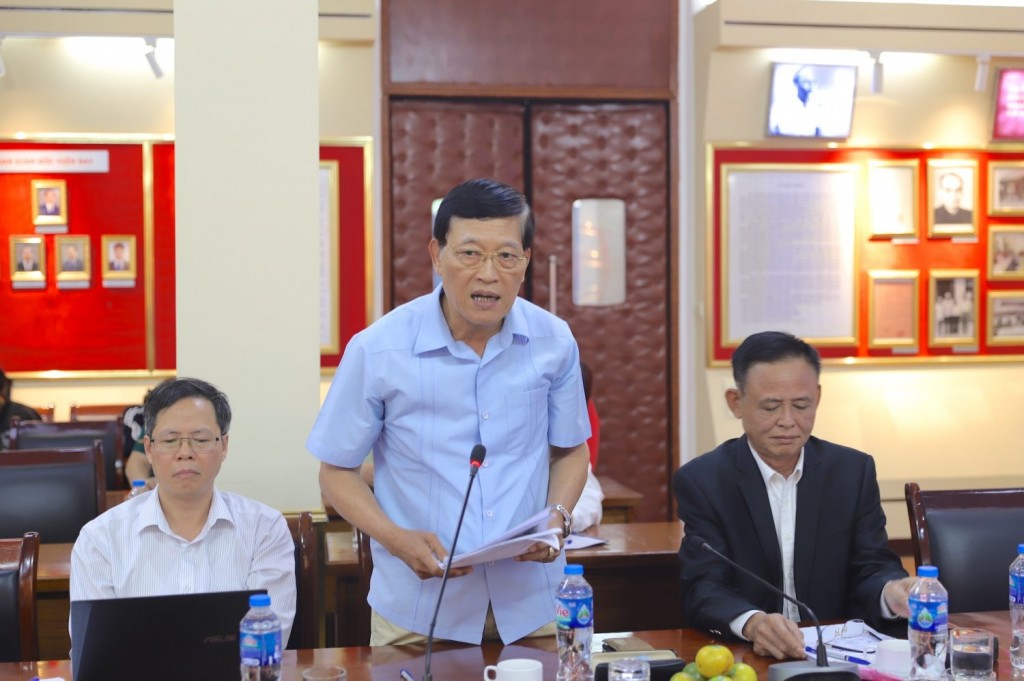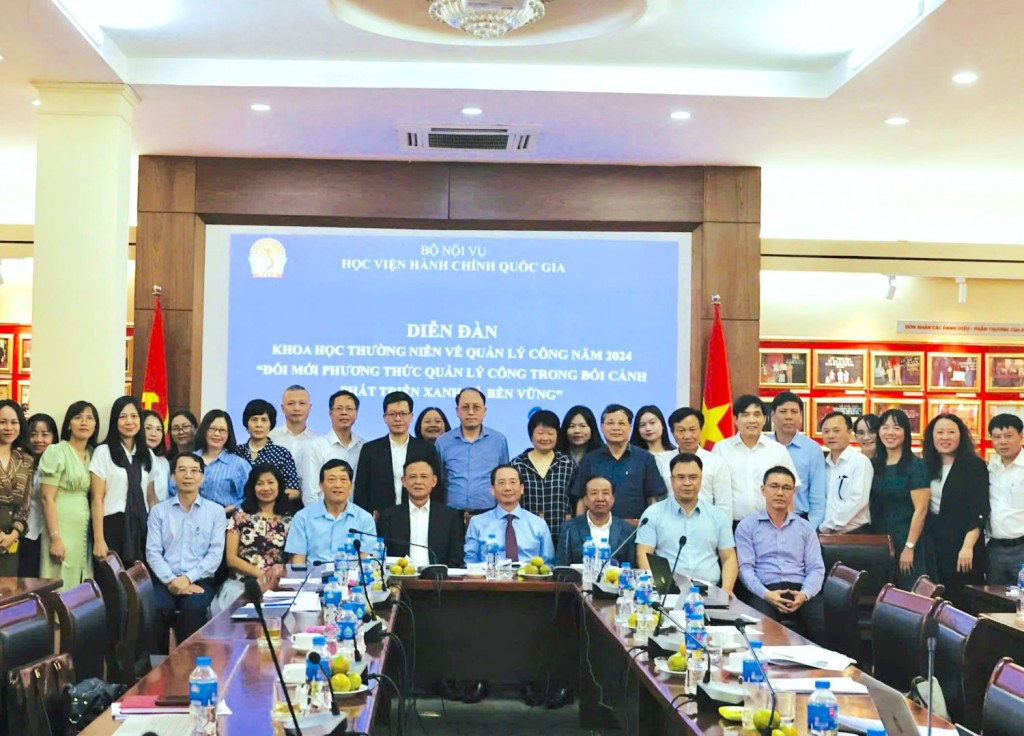On October 11, the National Academy of Public Administration (NAPA) held its annual 2024 Public Management Science Forum with the theme “Innovation in public management methods in the context of green and sustainable development”. Assoc. Prof. Dr. Nguyen Ba Chien, NAPA President; and NAPA Vice Presidents Assoc. Prof. Dr. Luong Thanh Cuong and Dr. Nguyen Dang Que co-chaired the forum.
Distinguished guests attending the forum included, from ministries and departments: Dr. Ha Cong Tuan, former Permanent Vice Minister of the Ministry of Agriculture and Rural Development and Chairman of the Vietnam Association of Agricultural Economics and Rural Development; Dr. Tran Van Tung, former Vice Minister of the Ministry of Science and Technology; Assoc. Prof. Dr. Le Van Chien, Director of the Institute of Leadership, Ho Chi Minh National Academy of Politics; Dr. Dinh Ngoc Linh, representing the Institute of Financial Strategy and Policy, Ministry of Finance; Mr. Nguyen Van Thuy, Director General of the Department of Legal Affairs, Ministry of Home Affairs; Dr. Vu Xuan Thanh, Deputy Director General of the Institute for State Organizational Sciences, Ministry of Home Affairs; Ms. Pham Thi Thu Hang, Deputy Director General of the Department of Non-Governmental Organizations, Ministry of Home Affairs; and Mr. Le Van Phuong, Deputy Director General of the Department of Planning and Finance, Ministry of Home Affairs.
International guests attending online included Prof. Richard Hazenberg, Director of the Institute for Social Innovation and Impact, University of Northampton, UK; Assoc. Prof. Dr. Kristoffer B. Berse, Dean of the National College of Public Administration and Governance, University of the Philippines Diliman; Mr. Olivier Lefevre, lecturer and expert in design thinking, analysis, and problem-solving, Kingdom of Belgium; Dr. Pham Thanh Thao, lecturer and senior consultant, French Republic; and Dr. Le Thanh Tuyen from the University of Northampton, UK.
From NAPA, there were Assoc. Prof. Dr. Nguyen Quoc Suu, NAPA Vice President; Prof. Dr. Nguyen Huu Khien, former NAPA Executive Vice President (attending online), along with leaders of affiliated units, scientists, staff, and lecturers from within and outside NAPA, attended both in-person in Ha Noi and online via Microsoft Teams.
In his opening speech at the forum, Assoc. Prof. Dr. Nguyen Ba Chien emphasized that the Development Strategy of the National Academy of Public Administration by 2030, with a vision to 2045, has outlined building and developing NAPA into a national center, on par with the region, for training civil servants and public employees, providing high-quality human resources, and conducting research aligned with the goals of sustainable development. This development will be focused on and prioritized, with quality and efficiency as the foundation, learners as the center, and NAPA’s autonomy as the driving force. NAPA will promote innovation and creativity, form and develop a comprehensive ecosystem, and build a digital academy that effectively meets the demands of sustainable national development. With the approval of the Minister of Home Affairs, NAPA is organizing the annual 2024 Public Management Science Forum, with the theme “Innovation in public management methods in the context of green and sustainable development”.
He emphasized that green growth and sustainable development have been a priority for the Party and the State of Viet Nam in recent years. On September 25, 2012, the government issued Decision No. 1393/QD-TTg, approving the National Strategy on Green Growth for the period 2011-2020, with a vision to 2050. This is Viet Nam’s first comprehensive national strategy for green economic development. The government affirmed that “Green growth is an important aspect of sustainable development, ensuring rapid, efficient, and sustainable economic growth, while contributing significantly to the implementation of the National Climate Change Strategy.”
However, in the context of green and sustainable development in Viet Nam, there are still challenges, such as limited public and business awareness about the green economy. This necessitates experts and scientists to provide academic research and arguments on sustainable development. The legal system also lacks consistency and coherence, with regulations on green and sustainable development spread across various documents and not fully aligned. Public management, when implementing the green economic development strategy in some sectors and regions, lacks cohesion and unity. Therefore, public management methods in Viet Nam must be innovated to adapt to the rapid changes in the socio-economic context, the Fourth Industrial Revolution, and the continuously shifting priorities of public administration to meet the goals and requirements of green and sustainable development.
The Public Management Science Forum, in the context of green and sustainable development, is an essential and significant platform. It allows scientists, experts, and participants to exchange knowledge, wisdom, and responsibility on the global issue of public management innovation in green and sustainable development. Assoc. Prof. Dr. Nguyen Ba Chien expressed his hope that the scientists, experts, and distinguished delegates would share their research results, lessons learned, new scientific discoveries, unique and specific interpretations, and appropriate and practical solutions. These contributions will provide the scientific, legal, and practical basis for innovating public management methods in the context of green and sustainable development in Viet Nam.
In his remarks at the forum, Dr. Nguyen Dang Que emphasized that Viet Nam has achieved significant and particularly important accomplishments. The country is increasingly integrating deeply into the global economic, political, and cultural spheres. State administrative reforms and improvements to the operational methods of the state apparatus have consistently been the Party’s policies and are essential conditions for fostering economic and social development, helping Viet Nam keep pace with global trends in public management innovation in the context of green and sustainable development. It can be affirmed that the process of reforming and renewing public management methods toward green and sustainable development has yielded positive results, making crucial contributions to the country’s economic development, ensuring national defense, security, and social equity, promoting economic integration, and elevating Viet Nam’s position on the international stage.
However, the practical implementation of the green and sustainable development policy in Viet Mam still faces many limitations and risks, as well as challenges. Given the urgent and important nature of green and sustainable development, this forum not only addresses theoretical, legal, and practical issues of green and sustainable development at the national, regional, and global levels but also focuses on discussing “Innovation in public management methods in the context of green and sustainable development”.
In addition to theoretical issues such as concepts, characteristics, theoretical foundations, content, roles, and factors influencing green and sustainable development, the forum organizers hope the scientists will focus on the following key points:
- Identifying the practical barriers, challenges, and opportunities for green and sustainable development in various sectors in Viet Nam, such as agriculture, industry, finance, and scientific and technological development.
- Analyzing trends, models, and innovative public management methods in the context of green and sustainable development.
- Reviewing the experiences of some countries around the world in innovating public management methods in the context of green and sustainable development, drawing implications that may be applicable to Viet Nam.
- Examining the current state of public management methods in the context of green and sustainable development in Viet Nam—its achievements, limitations, and underlying causes.
- Addressing the issues concerning policy formulation and implementation to meet the demands of green and sustainable development.
- Proposing solutions to renew public management methods in the context of green and sustainable development in Viet Nam.
Prof. Dr. Nguyen Huu Khien, in his presentation titled “Public Management Towards Green and Sustainable Development is a Mandate of Life,” introduced two key concepts that serve as the basis for analyzing the content. The term “public management” refers to state management (equivalent to terms like public administration, state administration, and national administration), while the term “green” reflects activities associated with a safe environment (similar to the concepts of green environment, green economy, and green development). The presentation also focused on analyzing the impact of management on environmental degradation, which is partly a limitation of the state apparatus’s social management. The state, through policies that encourage scientific development and support activities to increase labor productivity, has brought about positive results from activities that affect the environment to produce materials and resources for production.
From these management impacts that may cause environmental degradation, Prof. Dr. Nguyen Huu Khien proposed five principles for public management that need to be achieved to meet the requirements for green development (1) Compliance with objective laws in the relationship between social survival (of humans and humanity); (2) The science of management and scientific research should function as two aspects of management activities; (3) Emphasizing the social responsibility of public management, which should become a new mandate sufficient to contribute to green development management; (4) The principle of basic, relative balance (since absolute balance is unattainable) with harmonious economic growth and social development; (5) The principle of synchronization, ensuring alignment between political policies, legal systems, and management mechanisms.
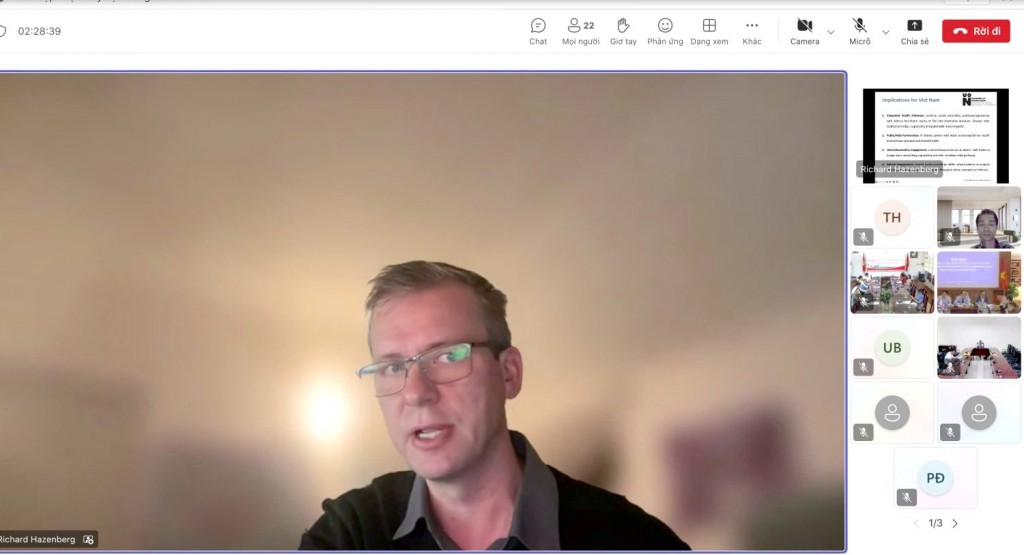
Prof. Richard Hazenberg, Director of the Institute for Social Innovation and Impact, University of Northampton, UK.
Prof. Richard Hazenberg presented a paper related to innovative solutions in healthcare titled “Sustainability in Healthcare: Social Prescribing as A Mechanism for Positive Health Outcomes.”
He highlighted the global challenges we face regarding human healthcare (such as an aging population and the increasing prevalence of poor health each year), which lead to rising healthcare and treatment costs. This presents a burden on social management that we deal with on a daily basis. Poor health affects various groups in society, not only the elderly, but also creates inequities in healthcare access due to factors related to economic conditions, such as differences between affluent citizens and manual laborers, indigenous people, and immigrants. This situation also causes imbalances in societal productivity, necessitating enhanced national social management.
The solution and impact of social prescribing involve traditional healthcare channels (hospitals, clinics) referring patients and citizens to community organizations (groups, associations) where they can receive broader social support. This, in turn, aids in treating and recovering mental health, providing individuals with more motivation in life.
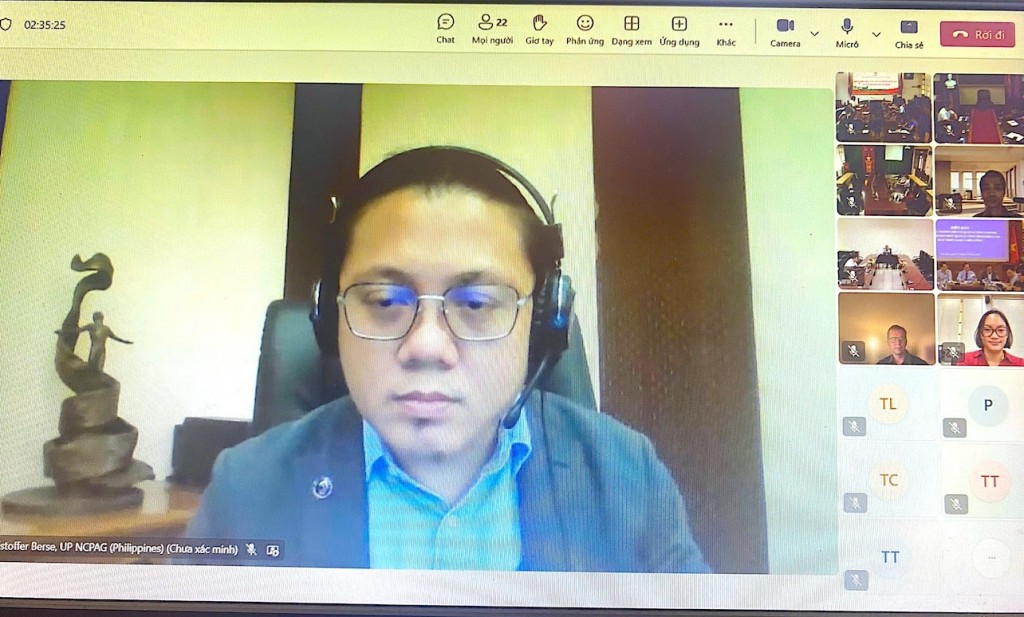
Assoc. Prof. Dr. Kristoffer B. Berse, Dean of the National College of Public Administration and Governance, University of the Philippines Diliman.
Assoc. Prof. Dr. Kristoffer B. Berse presented a paper titled “Innovating Public Management for Green and Sustainable Development in the Philippines,” which covered three main topics: (1) Green management in the Philippine Context; (2) Innovating management methods for green and sustainable development; (3) Importance of public management in addressing sustainable challenges, focusing on key points such as the Philippine Green Building Code, building resilience through green infrastructure, ecosystem-based natural resource management, nature-based disaster risk reduction management, lessons from international experiences, challenges and opportunities, as well as solutions, recommendations, and conclusions.
The suggested solutions focus on (1) Integration of ecosystem-based and nature-based solutions; (2) Enhancement of community participation and engagement; (3) Adopting standards and certifications for green buildings; (4) Development of integrated urban and rural planning; (5) Innovation of policies and flexible management; (6) Investment in research and capacity building to enhance public management effectiveness and sustainable initiatives.
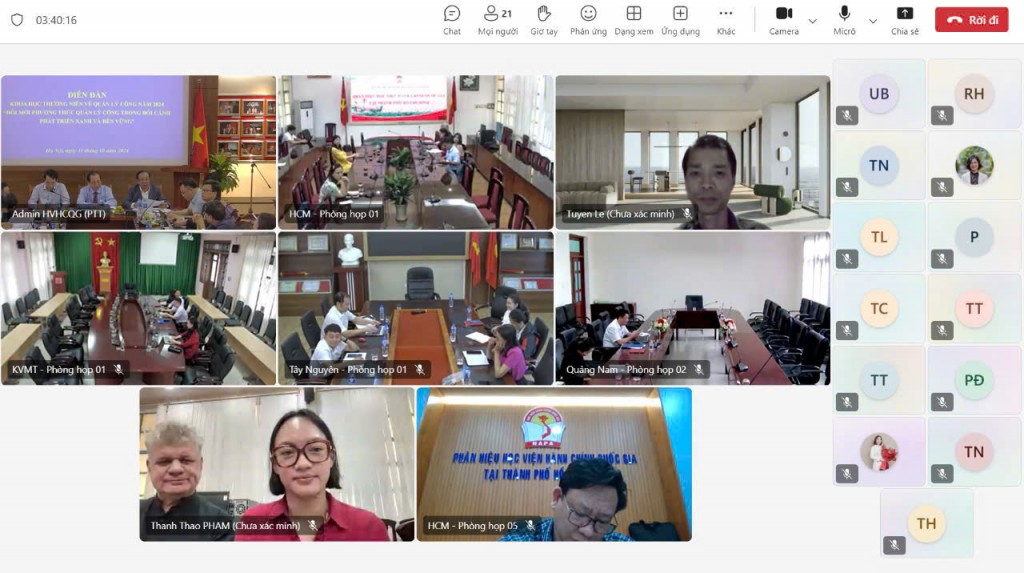
Dr. Pham Thanh Thao, lecturer and senior consultant, French Republic, and Mr. Olivier Lefevre, lecturer and expert in design thinking, analysis, and problem-solving, Kingdom of Belgium, at the forum.
Dr. Pham Thanh Thao, representing the research group, delivered a paper titled “Operationalizing Sustainable Transitions through Participatory Management and Stakeholder Engagement”. The presentation emphasized the importance of stakeholder engagement in the management process. Consequently, the research group focused on clarifying aspects related to participative management, stakeholder management, and the role of participative management in sustainable development and proposed co-design solutions as a theoretical framework for the sustainable development process. Through case studies in several countries (Bangladesh, Nepal, India), the research group provided specific lessons for operationalizing sustainable development.
Dr. Bui Thi Thuy Nhi, a lecturer at the Faculty of Economic Management, NAPA, represented her research group to discuss the topic of “State Management of Green Economy in the Context of Sustainable Development”. The paper highlighted the significance of green economic development as the prevailing model driving economic development globally and in Viet Nam in the present and future years.
Viet Nam has approved and continues to issue policies and strategic plans to promote actions responding to climate change, including the Green Growth Strategy for the 2021–2030 period and the National Action Plan for Green Growth for the 2021–2030 period. Thus, a green economy and green growth are inevitable and irreversible trends that have reached a stage requiring strong and effective action to realize those declarations and commitments. The research group pointed out the state of management regarding the green economy in Viet Nam since the implementation of the Green Growth Strategy for 2011–2020.
From the existing shortcomings and challenges in promoting green economic development, the research group proposed several policy solutions to accelerate the green transition in Viet Nam, contributing to the realization of the national strategy for green growth: (1) Adjusting environmental policies to align with the new situation; (2) Improving the policy framework to incentivize enterprises transitioning from outdated production models to environmentally friendly business models, and promoting research and application of science and technology; (3) Renewing mindset in environmental protection awareness among public officials, citizens, and businesses, emphasizing responsible behavior and practices towards the environment; (4) Continuing to improve the investment environment linked to criteria for environmental protection; (5) Diversifying financial resources for green growth.
Assoc. Prof. Dr. Tran Thi Dieu Oanh, Dean of the Faculty of State and Law, presented a paper on “Improving the Legal System in the Context of Sustainable Development.” She emphasized the importance of enhancing the legal system to promote sustainable development and meet necessary requirements while also proposing several recommendations for improving the legal system in this context, such as (1) Raising awareness and ensuring the implementation of the legal system within the framework of Viet Nam’s socialist rule of law and modern, effective national governance; (2) Continuously improving the democratic practice institutions to ensure people’s sovereignty; (3) Properly implementing laws related to human rights and citizens’ rights; establishing and improving mechanisms to guarantee and protect human rights and citizens’ rights, while emphasizing the responsibility of state institutions in respecting, ensuring, and protecting these rights; (4) Linking law-making with effective law enforcement; (5) Promoting effective decentralization and transfer of power, improving national governance towards modernity and efficiency.
Dr. Ha Cong Tuan discussed experiences in green and sustainable development through the application of science and technology to agricultural economic development. Currently, science and technology contribute over 30% to the added value in general agricultural production and 38% specifically in seed and livestock production, helping to promote sustainable agricultural development in Viet Nam. High-tech agriculture is an inevitable trend and the solution for developing sustainable agriculture in the country. This requires policy planning capabilities from managers, agencies, and ministries to collaborate in building coherent, methodological, and highly applicable strategies to create a proactive, high-quality Vietnamese agricultural sector that meets international export standards.
Dr. Tran Van Tung shared at the forum about choosing appropriate technologies for sustainable development based on available resources through the establishment of technical standards and norms. These standards serve as benchmarks for organizations and businesses to ensure green and sustainable development from the outset. Functional agencies should use these standards for products, services, and activities as metrics for sustainable growth. Ministries and sectors should formulate policies based on national development strategies so that state management agencies can properly fulfill their roles. Science, technology, and innovation through scientific research projects are essential benchmarks for green and sustainable development in Viet Nam, both now and in the future.
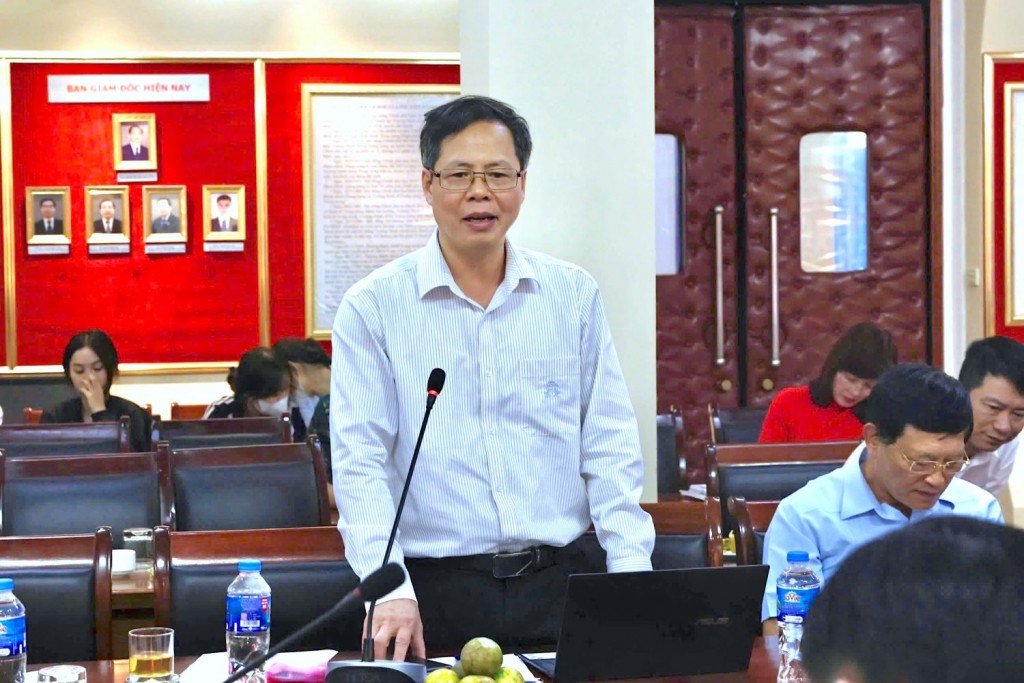
Assoc. Prof. Dr. Le Van Chien, Director of the Institute of Leadership, Ho Chi Minh National Academy of Politics, at the forum.
Regarding the issue of green and sustainable development in Viet Nam today, Dr. Le Van Chien suggested that proposals should be made to the National Assembly to establish a special task force to monitor the implementation of laws, including the Law on Environmental Protection, ensuring they are applied correctly, timely, and practically in terms of time and space. Any challenges or difficulties encountered during the implementation process should be reported to the National Assembly for necessary adjustments, aligning closely with the daily activities of citizens and businesses in environmental protection and the implementation of green production and business ideas. This would help Viet Nam move closer to its goal of achieving Net Zero by 2050.
In his concluding remarks at the forum, Assoc. Prof. Dr. Nguyen Ba Chien expressed his sincere gratitude for the practical contributions and insights shared by experts and scientists attending the forum, as well as those who submitted papers to the proceedings. He emphasized that green and sustainable development is a product of public management, but it also poses demands on public management to adopt appropriate management methods. This requires leadership, management, and administrative staff, including those at NAPA, to have a deep understanding and heightened awareness of environmental protection through public management in order to devise solutions that aim toward Viet Nam’s sustainable green development.
The forum also provided additional scientific and practical evidence, along with appropriate approaches from domestic and international experts, scientists, and managers. These contributions included feasible solutions to continue innovating public management methods in Viet Nam during the process of building a modern, effective national governance system, aiming towards the green and sustainable development goals of both the nation and the world in the context of international integration.


